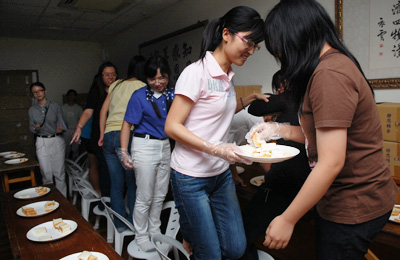
Li Yi Qian (left) and Zhan Wang (right) help a resident of the home in crafting a paper basket. (Photo by Zhou Zheng Yang)
“Ja-Ja-Jam-bo,Ja-Ja-Jam-bo,Ja-Ja-Jam-bo,Ja-Jam-bo!”
The afternoon’s quiet in the SASCO Senior Citizens’ Home was broken by the strains of a popular 60’s song. It was accompanied by a cha cha dance too, all because a group of youthful visitors had descended at the home on 19 June 2016, Father’s Day.
Tzu Chings (members of the Tzu Chi Collegiate Youth Association) from Tzu Chi Singapore organized a care visit to social institutions once a month and on this day, they had arrived to bring cheer to the 90 residents who call SASCO home. The planning team had started preparations for Parent’s Day a week ago, and member Lin Zi Xiong said, “It is Tzu Ching’s first visit here and we hope to leave a deep impression on the residents. Therefore, we have spent a lot of time in planning the day’s activities in the hopes of facilitating interaction between the elderly residents and Tzu Chings.”
Handmade Flowers—A Celebratory Gift of Blessings
Apart from the dance item, Tzu Chings also conducted a game, “passing the ball”, as an ice-breaking session. When the music stopped, the elderly grandpa or grandma who was holding on to the ball had to do a self-introduction. As they warmed up to the game, they even sang their favourite songs after announcing their names.
As it was also Father’s Day, Tzu Chings and the residents sat down together to craft some handmade carnation flowers. Smiles were all around when the elderly folk were presented the flowers by the Tzu Chings.
Grandma Pushpavalli has been staying at the home for the past five years and expressed her happiness at the visit. She said that life at the home was a structured affair. They would exercise after waking up in the morning and engage in handicraft work or other similar activities in the afternoons. They would have a change and play other games only when other community groups visited.
She further elaborated, “Although I can’t understand Chinese, there are volunteers who thoughtfully translated what was said to English. I really love the craft flowers made today and feel so happy. I look forward to your visit again next month.”
Wang Zi Qiao from the National University of Singapore felt that the home was conveniently located just 10 minutes from the South View LRT Station.
“I can engage in a meaningful activity and also invite my friends to participate. It’s also an opportunity to catch up with each other. Care visits to institutions teach us more than what the textbooks tell us, such as how to communicate with the elderly,” said Wang as he recalled how a stern-looking grandpa only warmed up to him after they had the chance to interact further over different activities.
Care Visits Sow the Seeds of Kindness
Commenting on how the day’s programme had unfolded without major hiccups, Tzu Ching mentor Douglas Lee said that it was the first time the Tzu Chings had visited the home and thus did not know the facilities and surroundings well. Though some issues arose, they were promptly dealt with, and the collegiate volunteers busied themselves enthusiastically with the task of interacting with the elderly. Lee praised the youths for their learning abilities as they could guide the elderly in the handicraft-making session even though they had only just learnt it themselves.
Wang Yi Shan, who used to work at HCA Hospice Care, was impressed by the commitment shown by Tzu Chi in its care activities, describing the one-to-one level of care shown, its readiness to offer a listening ear and the long-term emotional support rendered to beneficiaries as being “vastly different from some other organizations”. This was the reason that compelled Wang to contact Tzu Chi when she started working at SASCO.
Tzu Chi staff Liao Jie Ying, who manages the care visits, added that as the location of SASCO is near to the local universities of NUS and NTU, coupled with the fact that the Lee Ah Moi Home, which Tzu Chings used to visit, had the support of many other community groups, the decision was made for the youths to visit the former rather than the latter.
Lee summed up the objective of the visit, expressing his wish that such activities would sow the seeds of kindness in the youths, that they may invite their peers to engage in the same activities too.

A week before the home visit, Tzu Chings filmed a short introductory video that was screened for the residents viewing. (Photo by Cai Wen Qian)

The cha cha dance item put up by Tzu Chings brought cheer to the normally quiet SASCO home. (Photo by Chen You Yi)

Upon hearing the songs they are familiar with, the elderly residents start to sway their hands in enjoyment. (Photo by Chen You Yi)

During the ice-breaker session, residents of the home even warmed up enough to sing their favourite songs. (Photo by Zhou Zheng Yang)

The organizing committee leads the residents of the home in a handicraft session where paper carnations and baskets are made. (Photo by Zhou Zheng Yang)

Pushpaballi (left) has been a resident of the home for five years. (Photo by Chen Yong Liang)

Before the event ended, Tzu Chings posed for a group photo at the entrance to the home. (Photo by Chen Yong Liang)

Wang Yi Shan (right) who used to work at HCA Hospice Care was impressed by the commitment shown by Tzu Chi in its care activities. (Photo by Zhou Zheng Yang)



